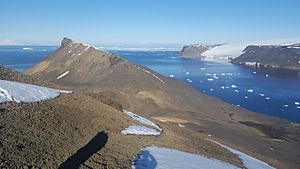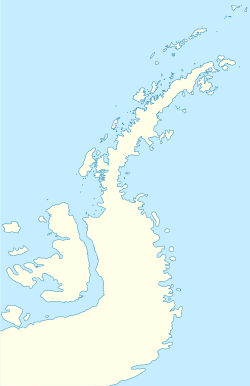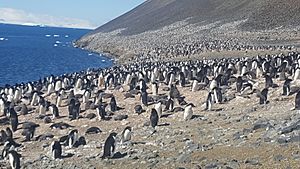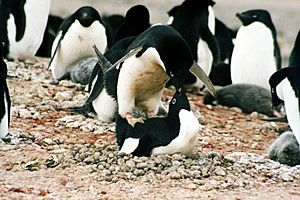Devil Island facts for kids
|
Antarctic Peninsula
|
|
| Geography | |
|---|---|
| Location | Antarctica |
| Coordinates | 63°48′S 57°17′W / 63.800°S 57.283°W |
| Archipelago | James Ross Island group |
| Administration | |
|
None
|
|
| Administered under the Antarctic Treaty System. | |
Devil Island is a small, ice-free island located near the northern tip of the Antarctic Peninsula. It is about 2 kilometers (1.2 miles) long and covers an area of 128 hectares (about 316 acres). This island is part of the James Ross Island group.
You can find Devil Island in a small bay, about 1 kilometer (0.6 miles) north of Vega Island. It is also east of the Trinity Peninsula. The island has several low hills, with the highest point reaching about 150 meters (492 feet) above sea level.
Island Geography: A Volcanic Past
Devil Island was formed by a volcano that erupted somewhat recently in Earth's history. The island is made up of two "volcano necks." These are the hardened remains of magma that once filled the vents of ancient volcanoes. Over time, the softer rock around these necks wore away, leaving the harder volcanic rock behind.
Around these volcanic necks, you'll find lots of "talus." Talus is a collection of broken rock pieces that have fallen from cliffs or slopes. It often forms a pile at the bottom of a steep hill.
Home to Many Birds: An Important Bird Area
Devil Island is a very special place for birds. BirdLife International has named it an Important Bird Area (IBA). This means the island is crucial for bird populations around the world.
The main reason it's so important is because of its huge breeding colony of Adélie penguins. About 15,000 pairs of these penguins come to Devil Island to nest and raise their young. It's an amazing sight to see so many penguins in one place!
Besides the Adélie penguins, other birds also nest on Devil Island. These include brown skuas, which are large, predatory seabirds, and snow petrels, beautiful white birds that live in cold regions. The island provides a safe and rich environment for these birds to thrive.
See also
 In Spanish: Isla del Diablo (Antártida) para niños
In Spanish: Isla del Diablo (Antártida) para niños
 | Claudette Colvin |
 | Myrlie Evers-Williams |
 | Alberta Odell Jones |





